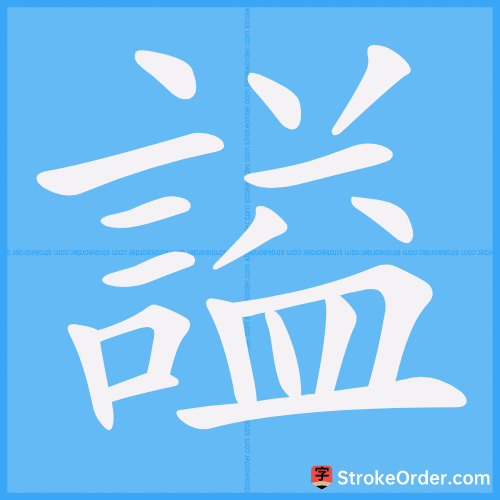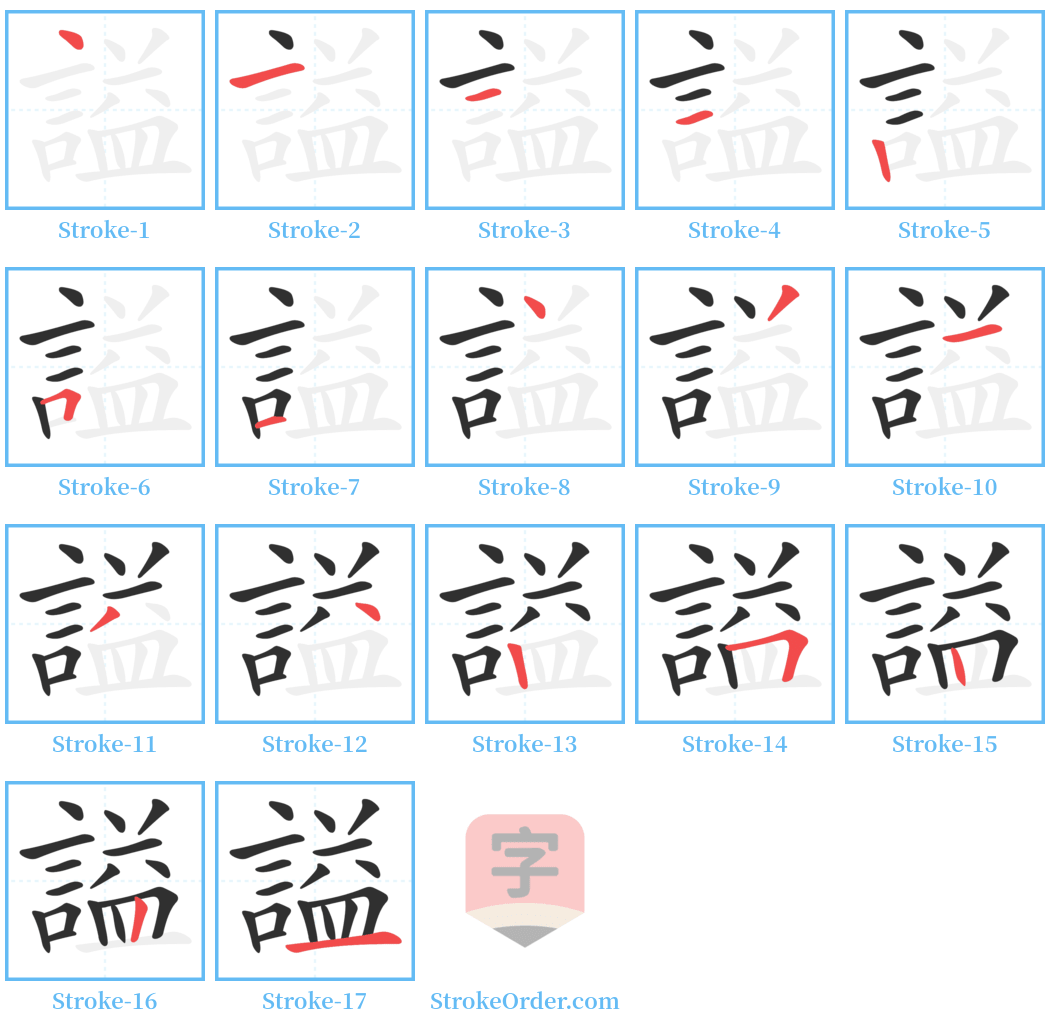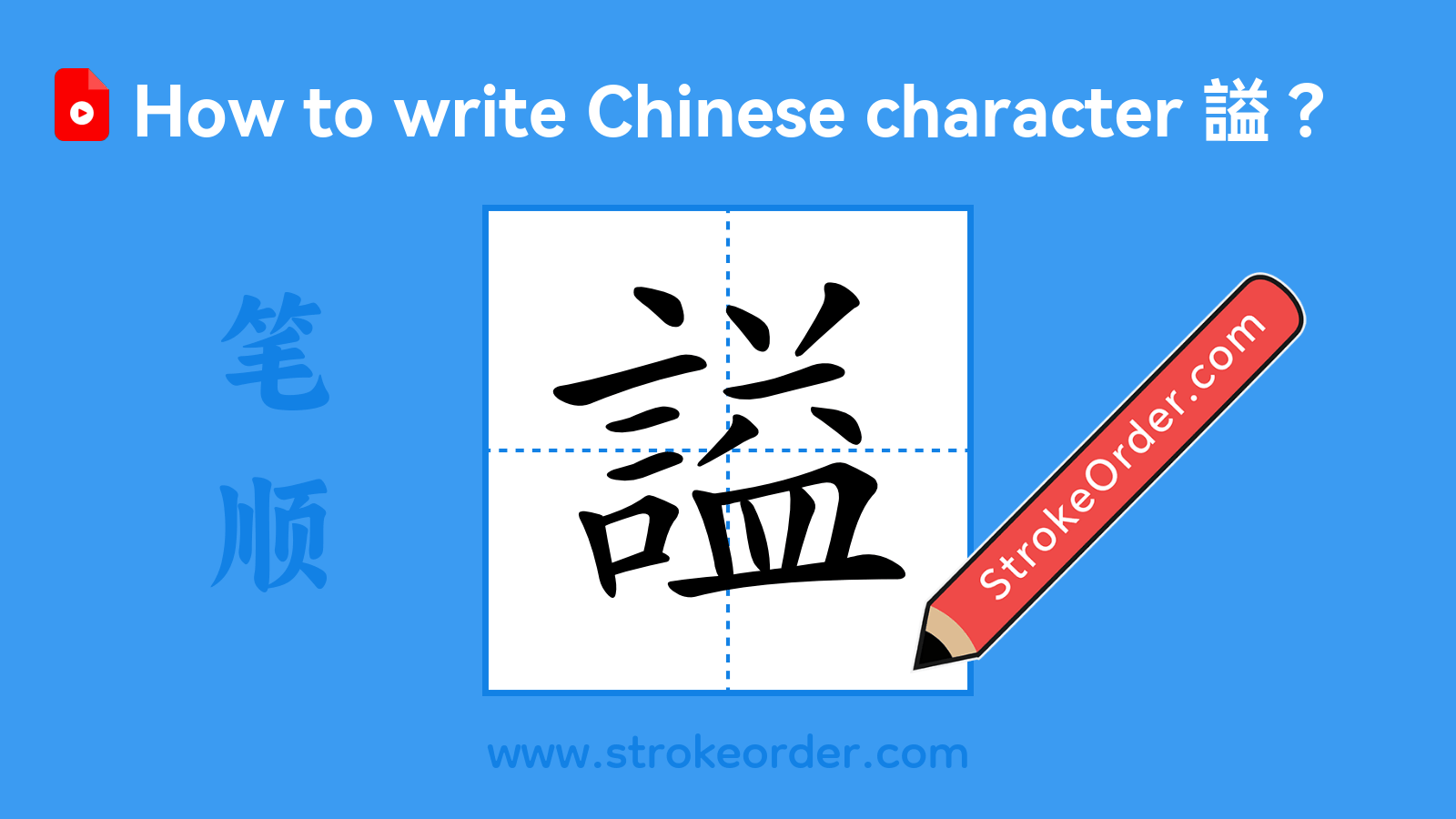謚 Stroke Order
Animated Stroke Order of 謚

Stroke Order Diagrams for 謚

Step-by-Step Handwriting Guide for 謚

Learn to Write Chinese Characters with Video Tutorials
Watch the video of writing the Chinese character "謚", learn the correct stroke order (笔顺) of the character "謚", and master the standard way of writing the character "謚".

Free Printable Handwriting Practice with Stroke Order: 謚
Printable Writing Practice Worksheet of "謚" in Portrait Orientation (Tian Zi Ge)

Printable Writing Practice Worksheet of "謚" in Landscape Orientation (Tian Zi Ge)

Information of 謚
Pinyinshì
Radical
言
Strokes
17 strokes
Usage
★★★
Definition
-
謚 shì [名] 1. A title given to ancient emperors, nobles, ministers, and other prominent individuals after their death, based on their lifetime achievements. 2. To confer a posthumous title. 3. Title; name. 4. Quietude. 1. A title given to ancient emperors, nobles, ministers, and other prominent individuals after their death, based on their lifetime achievements. "Therefore, observing their dance reflects their virtue; hearing their title reflects their actions." 2. To confer a posthumous title. "The people of Zheng reburied Duke You and titled him Ling." 3. Title; name. "Sima Xiangru lamented, 'To die without a name is to be called the utmost fool.'" 4. Quietude. "In *Erya*, it says, 'Title means calmness.'" 謚 shì [動] 1. To confer or award; especially refers to posthumous titles. 1. To confer or award; especially refers to posthumous titles. 本义: A title with evaluative significance conferred upon ancient emperors, nobles, ministers, outstanding officials, or other individuals of status after their death. 造字法: It is a phonetic compound. From "speech" to add sound. Since it bestows merit or demerit through remarks, it is thus connected to "speech." Originally written as "謚." 引: 1. From *Beitang Shuchao*, quoting from *Shuowen*: "謚 refers to the footprints of conduct." 2. From *Baihutong*: "謚 denotes distinction between noble and lowly; it highlights virtue." 3. From *Liji, Biaoji*: "Past kings conferred titles to honor their names." 4. From *Lunheng, Daoying*: "The title reflects actions done while alive." 5. From *Wuren Mubibei* by Zhang Pu in the Ming dynasty: "Increasing titles enhances glory after one's death." 例: 1. 謚法 (The act of a main mourner conferring a name to the deceased to honor their lifelong achievements) 2. 謚寶 (Seal used in ancient emperors' mausoleums, inscribed with the titles of emperor and empress) 3. 謚譜 (Records of posthumous titles) 4. 謚名 (Posthumous name) 謚 shì [動] 1. To confer or award; especially refers to posthumous titles. 引: 1. Wang Bao's *Dongxiao Fu*: "It is fortunate to receive a title as Dongxiao." 2. From *Records of the Grand Historian*: "To die without a name is to be the utmost fool, bringing shame to parents and laughingstock to the world." 例: 1. 謚告 (Announcement of a conferred title) 2. 謚典 (Ceremony for conferring a title) 1. Smiling appearance. 笑貌. "In *Yupian, Yanbu*: '謚 means a smiling appearance.'" 1. Laughing sound. 笑聲. "In *Jiyun, Xiyun*: '謚 means laughing sound.'"
Input Method for 謚
Pinyinshi4
Wubi
yuwl
Cangjie
yrtct
Zhengma
suol
Four Corner
08612
Unicode
U+8b1a
Same Pronunciation Characters
事什使侍势史嗜士始实室尸屎市师式恃拭拾施时是柿氏湿狮矢石示视誓识试
Same Radical Characters
言誉誊誓警譬訇訚訾詈詹謇訁訂訃計訊訌討訓訕訖託記訛訝訟訢訣訥訪設許
本文来自狙击月亮投稿,不代表汉字笔顺中文网英文版立场,如若转载,请注明出处:https://www.strokeorder.cn/strokeorder/20815.html

 微信扫一扫
微信扫一扫 